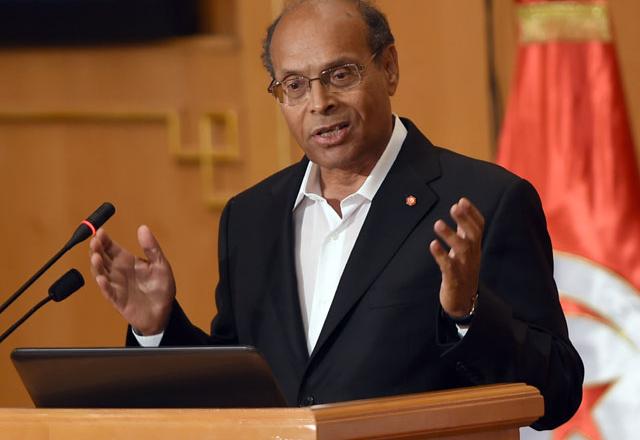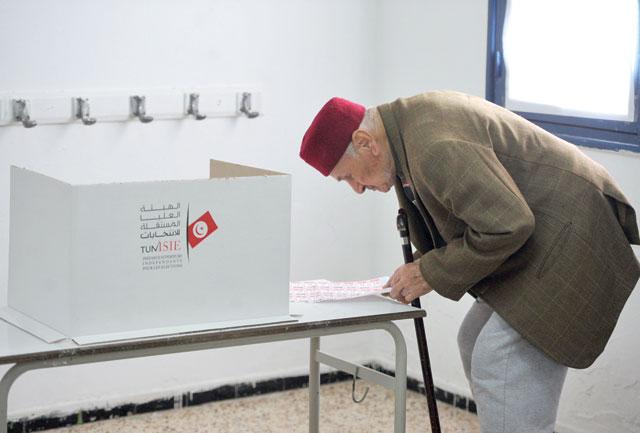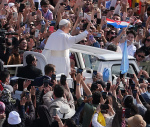You are here
Tunisia president declares re-election bid
By AFP - Sep 20,2014 - Last updated at Sep 20,2014

TUNIS — Tunisian President Moncef Marzouki announced Saturday he will stand for re-election in November, in a key vote almost four years after a revolt that sparked the Arab Spring uprisings.
The polls, along with parliamentary elections in October, are seen as the final step in Tunisia's transition after more than two decades under strongman Zine Al Abidine Ben Ali who was toppled in 2011.
The moderate Islamist party Ennahda won Tunisia's first post-Ben Ali election the same year.
Marzouki, a fierce opponent of Ben Ali and a secular ally of Ennahda, was chosen as president in December 2011 in a vote in the National Constituent Assembly.
The 69-year-old kicked off his re-election campaign with an attack on "dirty money" in politics.
"My candidacy is an example of transparency," he said. "We must not allow corruption in this first democratic experience," he said after registering for the November 23 vote.
Critics often accuse cronies of Ben Ali's former autocratic regime of seeking to derail the reform process.
Marzouki faces a number of rival candidates including National Assembly speaker Mustapha Ben Jaafar, a former central bank chief, and one-time premier Beji Caid Essebsi.
Essebsi, 87, earlier this month accused "infiltrators" in his party who oppose his candidacy of wanting to kill him, prompting an inquiry by prosecutors.
The north African nation, the cradle of the revolutions that shook the Arab world, is seen as a beacon of hope compared with other chaos-hit countries like Libya and Egypt.
But its transition to full democracy has been turbulent at times.
In the wake of the 2011 uprising, Tunisia was rocked by violence blamed on hardline Islamists who were suppressed under the former dictator, as well as social unrest over poor living conditions.
The authorities have struggled to root out militant groups, some of them Al Qaeda loyalists, who have killed dozens of police and troops since the revolution, particularly near the Algerian border.
One such group, Okba Ibn Nafaa, announced this week that it was throwing its support behind the Islamic State group, which has overrun chunks of Iraq and Syria.
Bete noire turned president
In January, Marzouki and other leaders signed a new constitution — seen as one of the most modern in the Arab world — that took more than two years to draft.
Executive power is divided between Prime Minister Mehdi Jomaa, who has the dominant role, and the president, who retains important prerogatives, notably in defence and foreign affairs.
Marzouki, a French-trained doctor and veteran opposition rights activist, was Ben Ali's bete noire throughout his political career and was forced to live in exile in France for a decade.
His critics say presidential ambitions motivated him to form an alliance with Ennahda.
Marzouki has insisted that the coalition was the only way to ensure sustainable democracy.
His rise to power came almost a year after the self-immolation of a Tunisian street vendor sparked a protest movement that spread across much of the Arab world, sweeping away long-time dictators in Egypt and Libya.
Marzouki headed the Tunisian League for the Defence of Human Rights from 1989 until 1994 when he was forced out by Ben Ali supporters.
A prolific writer, he has penned several books in French and Arabic including one titled "Dictators on Watch: A Democratic Path for the Arab World".
Related Articles
Tunisians vote on Sunday in a presidential election pitting an ex-official from the days of autocrat Zine El Abidine Ben Ali against a rights activist appealing to the spirit of the 2011 revolt that ousted him.
Moncef Marzouki and Beji Caid Essebsi are to face off on December 21 in Tunisia's second round of presidential voting to decide who leads the nation that sparked the Arab Spring.
Tunisians voted Sunday in their first presidential election since the 2011 revolution that sparked the Arab Spring, in a ballot set to round off an often fraught transition to democracy.















